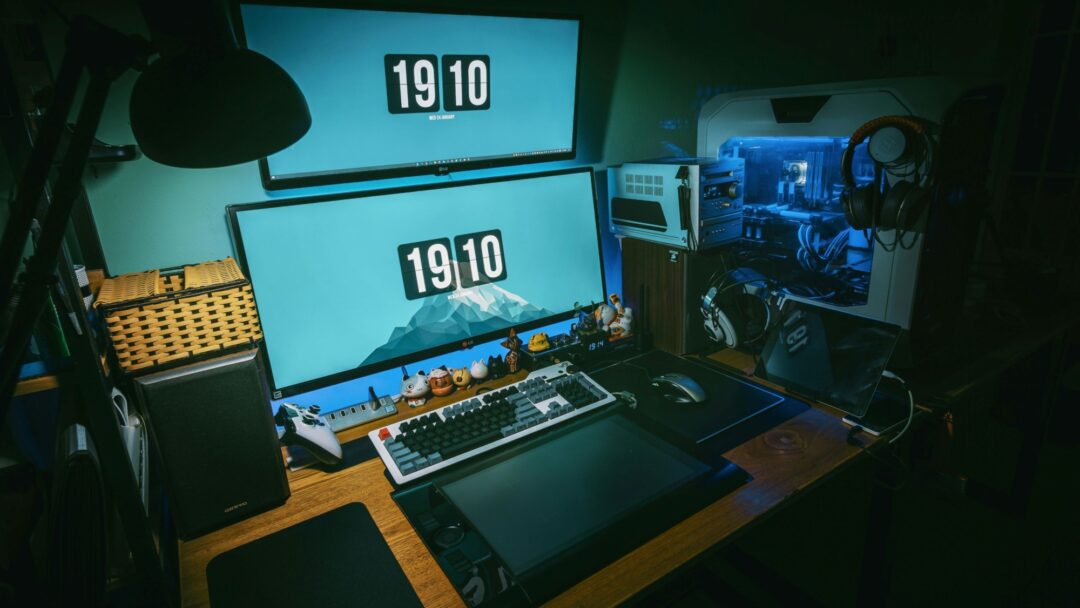Audio
David Woodbridge - Tech Update Part 2
Ablequest by
2RPH3 seasons
28/7/2023
14 mins
In Part 2 of this conversation with 2RPH's Ablequest, expert David Woodbridge reviews latest assistive technologies.

David Woodbridge, an expert in assistive technology for people with low or no vision who draws on his own lived experience, is a regular guest on Ablequest. In conversation with Barbara Sullivan, David gives an update on the latest in a wide range of technologies designed to make everyday life easier and more interesting.
Original broadcast date: 28.07.23
Speaker 1 00:04
With information on the latest developments in assistive technology and initiatives, the studios of 2RPH in Sydney bring you AbleQuest. Hello, I'm Elaine Wziontek. Last time on AbleQuest, Barbara Sullivan spoke to David Woodbridge about the latest in assistive technology for people with no or low vision.
Speaker 1 00:30
David has worked as an adaptive technology consultant at Vision Australia for over 25 years. In his role, David assesses, recommends and installs assistive technology solutions for clients. He also researches and evaluates new and upcoming technology that can help blind and visually impaired people be more independent.
Speaker 1 00:53
Apart from discussing the exciting new assistive technology, David tells Barbara about his new interest in karate, which is certainly a feat for a blind person.
Speaker 2 01:04
David, what else is happening with iPhone?
Speaker 3 01:07
Well, after a while we've got the whole iOS 17 beta series going on, which has started about early June. We won't see those consumers until September, but one of the two interesting things in that blind and low -bring people in particular, one of them is called Tinkerspeak.
Speaker 3 01:25
So if you point the camera at a touchscreen, the camera takes this picture of the actual screen, and then when you point your finger at the screen, because your finger is blocking a button, the software knows that that's an active button and you're about to touch, and it tells you the name of the button.
Speaker 3 01:45
So theoretically, you could use any touchscreen device that you could basically point to. It speaks the name of the button, and then you can just tap your finger on the screen, and it really does work.
Speaker 3 01:58
That's based on artificial intelligence. I've tried it on my Touch Coffee machine, and it works really nicely. So that's number one. The number two one, I guess, it's not so much for blind people, but it's for people that, for some reason or another, can't talk on the telephone, but can see well enough on the phone call, and it's called LiveSpeak.
Speaker 3 02:20
So what you can literally do is either have precip phrases, or you can type in on your keyboard, and then when you hit enter, what you've just typed in gets sent to the caller with voice output. So you could say, hi, I'm David.
Speaker 3 02:36
I'm using a text to speech to talk to you because I can't speak using my voice. Something like please be patient while I communicate, you buy a topic on the keyboard, and I think that's actually pretty amazing.
Speaker 3 02:49
The other thing you can do, if you don't have a voice, you can also get yourself or someone else to record a human being's voice that you could then use rather than the text to speech electronic voice.
Speaker 3 03:02
So when you set your own personal voice up, you read out different phrases for about 15 minutes, and then based on that sample, it will then use or generate a voice that's similar to your own. Other systems that are on the market can listen to three seconds of a voice based on AI technology and basically bingo, there's your voice and some are close and some are not.
Speaker 3 03:28
I've found with our Aussie accent, it doesn't work too well because I think most of these things are trained on the US accent. Last time I did mine, I got rid of it because I said it like a psychopath.
Speaker 3 03:42
Yeah, no thanks. I'll keep using my own voice by text speech banks.
Speaker 2 03:47
Talking of AI, David, there's been so much talk about chat GPT AI. How important is this for people with blind and low vision?
Speaker 3 03:56
Well, look, I think it's actually fairly interesting. Now, besides the German Glen people that think the world's about to end, I would say, number one, you could use this thing with common sense. So, you know, don't always believe the things that it tells you, because yes, sometimes it actually does get along.
Speaker 3 04:12
You're still talking to a computer system. So what you're actually talking to is what's called a very large language model, which has lots and lots of information in it, and not all of it is correct.
Speaker 3 04:24
So, for example, I asked it what the letter O was in Braille, and it came back with three dots, which is correct. The problem was it was the wrong three dots. So, little things like that, that it just gets incorrect.
Speaker 3 04:36
But the other day, I had to write an email to a business to encourage them to use web accessibility, and I wanted them to have examples of good practices for web accessibility. So I sent to the Bing chat AI, I was on GPT -4, and I said, can you please write me an email to a business explaining the benefits of web accessibility and give examples, and also talk about professional development moving forward.
Speaker 3 05:12
And it basically gave me this, I don't know, about 10 paragraphs long email, which started something like, did you serve Madam, hope this email finds you well, I would love to bring to your attention web accessibility guidelines, because your website is so fantastic, such information that we're about to give you would make it even better.
Speaker 3 05:36
But it just went on, and I thought, you sit back and you go, I could not have written such a really, really good email than this thing did. So that worked really nicely. The other one was, you can also play games with it, which is actually pretty cool.
Speaker 3 05:50
So you can say, I'd like to play a text adventure game, and then it will come back and say, well, okay, so what sort of text adventure game would you like to play? And I'd say, look, I want one in a haunted castle.
Speaker 3 06:03
So then it says, okay, that's fine, you're in a haunted castle, there's a door to the left that is open, there's a suit of armor in the corner that's glowing and so on and so on. So from that point of view, it's great.
Speaker 3 06:17
The other benefit of, I guess, of being curious, that because it's connected to the internet, you can also get real -time information, because remember that with GPT4, the language model still goes up to, I believe, 2021.
Speaker 3 06:32
So anything later than that, it's not gonna happen.
Speaker 2 06:35
Hmm.
Speaker 3 06:35
but just the amount of information. And if you want like programming coding examples, like I said, you wanna write emails, you wanna find out some really cool jokes, you wanna send somebody a very sarcastic or grumpy or nice email.
Speaker 3 06:51
You wanna get prompted to plot yourself to write a story. It's almost anything that you can imagine goes with chat GPT. It's amazing now that even with NASA, I was reading an article earlier this month, and apparently NASA's gonna use some type of conversational AI, which again is chat GPT, cause only one example of it.
Speaker 3 07:16
They're talking about next couple of years when they have a learner's space station up around the moon, rather than using something as basic as Google or a lexical theory.
Speaker 2 07:28
Hmm.
Speaker 3 07:28
If you're going to go for a bit of a spacewalk, then you could say to the conversational AI, pie Marvin, whatever its name is, and I'm about to go external to the space station and you walk me through the steps of what I need to get ready.
Speaker 3 07:44
So you can have a conversation with the AI that may and the AI might even come back and say, well, I got a minute, David. Yeah, it's not a good time at the moment because we've got a solar flare happening.
Speaker 3 07:54
So you probably don't want to go for a spacewalk at this time of day. But just the fact that the relevance that varies with the robotic ask the question, get an answer back, this thing can interpret what you might be asking and then give you different answers back based on the conditions.
Speaker 2 08:14
The sense I get is that four people that need assistive technology, that it's got to be of huge assistance. It's like research, the amount of time that it would take you to research certain things. The trouble is determining where the information is coming from.
Speaker 3 08:30
That's right. Now with being, it actually does give you a list of resources that have actually accessed. If I know the topic, then I know what it's wrong. But if I don't know the topic, I've got no idea where the information has just sped out at me, it's actually accurate or not.
Speaker 3 08:44
But the only thing that's just popped into my mind while we're talking with artificial intelligence in general is the Bevoi ISAP, which is used as a volunteer go -up service and get video support from a site of person.
Speaker 3 08:58
That's also got this virtual assistant type thing that's hopefully coming out at the end of 2023. And what that will do, it will say, you are looking at a magazine page with your camera. There are three houses on the page and a dog, a family having a picnic.
Speaker 3 09:17
And then you can say things like, tell me what the second house looks like. What breed is the dog? What color is the dog? What are the people doing? Is it a mum and dad and children? What might they be playing?
Speaker 3 09:31
Are they playing with the dog? So you can actually interrogate what the actual camera, if you like, is looking at. Now, if you take that to a real life environment, there's no reason why I can't say if you go to your left, you'll find the turnstile to go into the railway station.
Speaker 3 09:48
Or your bus is to the left slightly obvious. I walk three or four metres in front. So that's the type of artificial intelligence that I'm looking forward to. So besides the information and research type stuff, what I want is an AI to interpret the environment correctly and give me information based upon what it's quote seen.
Speaker 2 10:10
So when do you think that's likely to happen?
Speaker 3 10:12
Next couple of years. So yes, and that's why I'm so excited about the Vision Pro, which is the headset coming out from Apple, which supposedly out in the band around about next year. Now that will look at the environment and use the AI, which by the way is already in the iPhone already.
Speaker 3 10:33
So with the camera in the iPhone already, I can tell where the doors are, what side the door opens in, if there's any people around me, what the distance people away from me, what the camera's looking as far as images and retext.
Speaker 3 10:48
Now if you transfer that to a wearable headset, you've got a hands -free system which can do all that sort of stuff.
Speaker 2 10:57
And that's Vision Pro, ProHeads.
Speaker 3 10:59
Okay, that's the one from Apple. So it seems like the all cam which does text reading and does barcode Anything else you got the envision smart glasses. I think the division pros gonna do all of that and much more So it's gonna be really interesting to see when that it's the market I think we'll go towards in the next year What it does because you can also run apps on it as well If I wanted a different app from my iPhone on my iPad Yeah, I can also use them with the vision but and of course, it's fully accessible for both blind and low vision people
Speaker 2 11:32
So for example, you mentioned color identification before. So if you loaded that app onto this, you could just look at your wardrobe and it'll tell you exactly where your brown shirt is or whatever.
Speaker 3 11:43
Correct, that's right. Absolutely. All your farmers, because I do karate now, which I've been doing for the last 12 months, so if I want to make sure that I've got a white t -shirt, so when I put a t -shirt on, it has to be a white t -shirt underneath, because otherwise it stands out too much.
Speaker 3 11:57
So I can say to Vision Pro, you know, whatever the command is, or do a hand gesture, run the color app, and ask you, is this a white t -shirt or not?
Speaker 2 12:06
So you're doing karate, that's phenomenal. Have you had any problems? No, this is the thing.
Speaker 3 12:11
about the NDIS because I've got a support person that helps me in the class which just happens to be one of the senseis or one of the trainers there. So I do karate two days a week. My support person or my buddy if you like, they help me out of class.
Speaker 3 12:27
So when the main trainer says we're going to go for a forward stance or a back stance or we're going to practice our strikes or anything else, he'll just make sure that I've got what they would be in demonstrations and what they were talking about and the knife got along.
Speaker 3 12:40
But the thing I like about it is because I don't quote sheet and look at what other people are doing, I'm going to put everything into muscle memory. When it comes to graduation day and everybody has to face the audience and not the mirrors which has been doing before to see what they're doing, they find it really hard.
Speaker 3 12:55
So I feel quite smug on my graduation days and I don't have that problem. But no, it's going really well. Good for my balance. It's good for my mental health and I just absolutely enjoy it because I hate doing exercise where there's no purpose to it.
Speaker 3 13:09
Whereas because I'm doing cutters, which is like dance forms, I'm doing general exercise and all the other things that go with it, I sort of have a purpose behind it. I love it. So I think since I first started in May last year, 2022, it's been two days a week nonstop and I have not missed doing training for at least 90 minutes per day.
Speaker 2 13:32
That is phenomenal.
Speaker 3 13:33
I just have a blast and now because I train so hard, I'm one of the people that do some of the demos on the floors. And because both my children are black belts, I've got my own training folks at home as well.
Speaker 3 13:44
Only two and a half years ago I got to get my black belt, so I shall let you know.
Speaker 1 13:48
That was part two of a conversation with assistive technology expert David Woodbridge. And if you missed part one, you can listen to it on the podcast that you can get from the 2rph website to rph .org .au
Speaker 2 14:10
You have just been listening to AbleQuest, a program that looks at developments in assistive technology and initiatives. From Elaine Wziontek and Barbara Sullivan, thank you for listening and goodbye till next program.
Continue listening

Blind Sports Australia CEO Matt Clayton speaks about its work with blind and vision impaired athletes across 21 sports.
Matt Clayton - Blind Sports Australia
Ablequest by 2RPH
5/5/2023
•13 mins
Audio

Vivid, Sydney's celebration of creativity, seen from a disability access focus by its director.
Gill Minervini - Vivid
Ablequest by 2RPH
19/5/2023
•14 mins
Audio

This program discusses dance movement therapy and how it works - featuring Cecilia King of the Dance Therapy Association.
Cecilia King - Dance Therapy
Ablequest by 2RPH
14 mins
Audio

What are the challenges of providing audio description on Oz TV? Hear Lauren Henley, Aust Federation of Disability Organisations.
Lauren Henley - Audio Description
Ablequest by 2RPH
16/6/2023
•14 mins
Audio

In Part 1 of a 2RPH interview, assistive tech expert David Woodbridge explores latest innovations to make everyday life easier.
David Woodbridge - Tech Update Part 1
Ablequest by 2RPH
30/6/2023
•14 mins
Audio

Features Robert Duff-Silsby of Luddi, Perth company developing assistive devices for all people and bodies.
Robert Duff-Silsby - Sexual Wellbeing
Ablequest by 2RPH
13 mins
Audio

In Part 2 of this conversation with 2RPH's Ablequest, expert David Woodbridge reviews latest assistive technologies.
David Woodbridge - Tech Update Part 2
Ablequest by 2RPH
28/7/2023
•14 mins
Audio

Matt Clayton of Blind Sports Australia and the Oz team's Chef de Mission, discusses the forthcoming World Blind Games in the UK.
Matt Clayton - World Blind Games
Ablequest by 2RPH
11/8/2023
•13 mins
Audio

Prof Kim Marriott of the Monash Assistive Technology and Society Centre, talks about the purpose and work of the Centre.
Kim Marriott - Monash Assistive Technology and Society Centre
Ablequest by 2RPH
25/8/2023
•13 mins
Audio

Ablequest features an interview with Serena Ovens, new CEO of Assistive Technology Supplies Australia or "ATSA".
Serena Ovens - Assistive Technology Supplies Australia
Ablequest by 2RPH
14 mins
Audio

Part 1 of an interview on the voice-activated app, Bindi Maps.
Anna Wright - Bindi Maps (Part 1)
Ablequest by 2RPH
14 mins
Audio

This is Part 2 of an interview with Dr Anna Wright, explaining how Bindi Maps works.
Anna Wright - Bindi Maps (Part 2)
Ablequest by 2RPH
14 mins
Audio

Artist Ebony Wightman of disability-led We Are Studios talks about art and challenge.
Ebony Wightman - We Are Studios
Ablequest by 2RPH
20/10/2023
•13 mins
Audio

Prof. Leeanne Carey discusses the SENSe program, her team's world-first therapy to help stroke survivors.
Leeanne Carey - SENSe Therapy
Ablequest by 2RPH
2/11/2023
•13 mins
Audio

Youthworks Accessibility Minister Bec Baines talks of making church accessible to young people with disabilities.
Bec Baines - Youth and Worship
Ablequest by 2RPH
16/11/2023
•14 mins
Audio

Nikki Hind, Australia's first blind fashion designer, discusses her work.
Nikki Hind: Blind Grit
Ablequest by 2RPH
1 December 2023
•14 mins
Audio

Dr Dimity Williams, family GP, recommends spending more time in nature - and a "green hour" each day.
Green Hour: Dr Dimity Williams
Ablequest by 2RPH
5 December 2023
•14 mins
Audio

Imagine sitting in a wheelchair for hours, being unable to move your fingers or arm to do simple things like pick up a glass.
Konstanze Hager - Bateo
Ablequest by 2RPH
Konstanze Hager - Bateo
•14 mins
Audio

Action Audio is a new language being created to transcend sport.
Machar Reid - Action Audio
Ablequest by 2RPH
Machar Reid - Action Audio
•14 mins
Audio

What a difference one person with experience, passion and energy can make to many lives.
Julie Ross-Edwards - Head High
Ablequest by 2RPH
Julie Ross-Edwards - Head High
•14 mins
Audio

Driver educator outlines what's needed for a person with disability to get a driver's licence.
Ronak Shah: on-road driving education
Ablequest by 2RPH
12 January 2024
•14 mins
Audio

Vision Australia's Christo Sarantakis talks of his life, blindness and assistive tech changes.
Christo Sarantakis of Vision Australia
Ablequest by 2RPH
26 January 2024
•14 mins
Audio

Introducing Australia's first pictureless feature film, TOUCH, showing in Sydney.
Majella Knobel: "Touch" - open air movie
Ablequest by 2RPH
9 February 2024
•14 mins
Audio

An expert discusses the use of horticultural therapy for people with disabilities.
Steven Wells: horticultural therapy
Ablequest by 2RPH
23 February 2024
•14 mins
Audio

Features articles on latest blind-assistive tech including a new bus app and smart ear buds.
Assistive tech news catchup
Ablequest by 2RPH
8 March 2024
•14 mins
Audio

Features an innovative hospitality industry training program for people with disabilities.
Saraya O'Connell - Hotel Etico Independence Program
Ablequest by 2RPH
22 March 2024
•14 mins
Audio

Guests discuss the Obi robotic dining assistant for people with upper arm disabilities.
Hugh Kingley and Rachel Dekkar: Obi
Ablequest by 2RPH
19 April 2024
•14 mins
Audio

A spy-themed computer program tackles the mystery of social encounters - outlined by its company's CEO.
Kathleen Davey - Social Science Translated
Ablequest by 2RPH
3 May 2024
•14 mins
Audio

A Sydney organisation delivers creative arts and life skills to people with disabilities.
ChoppA Green - Studio Artes
Ablequest by 2RPH
17 May 2024
•14 mins
Audio

An award-winning Central Coast NSW disability service shares its successful strategies.
Lonestar Makoni - Breaking Barriers Disability Services
Ablequest by 2RPH
31 May 2024
•14 mins
Audio

Part 1 of a conversation with an Australian neuroscience research pioneer about benefits of music in brain injury recovery.
Professor Sarah Wilson (part 1)
Ablequest by 2RPH
14 June 2024
•14 mins
Audio

Part 2 of a conversation with a leading neuroscientist of benefits of music in brain injury recovery.
Professor Sarah Wilson (part 2)
Ablequest by 2RPH
28 June 2024
•14 mins
Audio

A CEO talks about his company's award-winning assistive physical therapy device.
Justin Keenan - LusioMate
Ablequest by 2RPH
12 July 2024
•14 mins
Audio

Information about a program teaching good cyber-security practices to make daily life safer.
Jess Wilson: Be Connected
Ablequest by 2RPH
26 July 2024
•14 mins
Audio

A veteran print disability broadcaster with macular degeneration shares her experiences.
Teresa Plane - 2RPH
Ablequest by 2RPH
9 August 2024
•14 mins
Audio

The founder of a blind-assistive technology company shares latest developments.
Peter Ford - Control Bionics (part 1)
Ablequest by 2RPH
6 September 2024
•14 mins
Audio

Part 2 of an interview with the head of an innovative blind-assistive technology company.
Peter Ford - Control Bionics (part 2)
Ablequest by 2RPH
20 September 2024
•13 mins
Audio

Looks at a project to better inform refugee and migrant women on AI.
Good Things - Jess Wilson
Ablequest by 2RPH
4 October 2024
•14 mins
Audio

An expert with lived experience corrects some widespread misconceptions about stuttering.
Dale Williams - Stuttering Awareness Day
Ablequest by 2RPH
18 October 2024
•14 mins
Audio

An inventor discusses his an innovative cane tip to help people with blindness or low vision.
Peter Rickards - Sensaball
Ablequest by 2RPH
15 November 2024
•13 mins
Audio

Part 1 of an interview with an Australian expert on low-vision-assistive technology, on AI and other developments.
David Woodbridge (part 1)
Ablequest by 2RPH
29/11/2024
•14 mins
Audio

Conclusion of an interview with a leading Australian expert on blind-assistive technology.
David Woodbridge (part 2)
Ablequest by 2RPH
13 December 2024
•14 mins
Audio

Looks at the leading stroke treatment work of the Royal Rehabilitation Hospital, Ryde NSW.
Jason Redhead and Graham Cooper of Royal Rehab Ryde
Ablequest by 2RPH
10 January 2025
•14 mins
Audio

An innovative social media platform aims to address isolation and loneliness in the disability community.
Steve Bear - Alvie
Ablequest by 2RPH
7 February 2025
•12 mins
Audio

Australia's largest provider of Auslan sign services outlines its important work.
Brett Casey - Deaf Connect
Ablequest by 2RPH
21 February 2025
•14 mins
Audio

Looks at an Australian organisation's work at helping men seek help and build self-awareness.
Tommy Herschell - Find Ya Feet
Ablequest by 2RPH
7 March 2025
•14 mins
Audio

A speech pathoplogist discusses her work with young people's complex communication needs.
Denise West - Scope
Ablequest by 2RPH
21 March 2025
•14 mins
Audio

A vision-impaired disability rights advocate talks of her work and learning podcast skills.
Freya Wolf
Ablequest by 2RPH
4 April 2025
•14 mins
Audio

A leading Australian eye researcher talks of his team's work in creating new hope for people with retinal damage.
Raymond Wong - Centre for Eye Research Australia
Ablequest by 2RPH
18 April 2025
•14 mins
Audio

A wheelchair-using business owner, facilitator and car rally driver shares experiences and insights.
Mel Harrison - Sitting Low, Reaching High
Ablequest by 2RPH
2 May 2025
•13 mins
Audio

Disability Pride Month in July promotes awareness about people with disability and also celebrates individuals with disability.
Hannah Solomons - Sydney Disability Pride
Ablequest by 2RPH
Hannah Solomons - Sydney Disability Pride
•14 mins
Audio

Deb Roach is a three-time pole dancing world champion yet she has only one arm.
Deb Roach
Ablequest by 2RPH
Deb Roach
•13 mins
Audio

Being in nature is good for you whether it is being in the garden or walking along the beach.
Kayte Kitchen - Admirari Nature Therapy
Ablequest by 2RPH
Kayte Kitchen - Admirari Nature Therapy
•14 mins
Audio

Music can evoke emotions that bring back memories and the same is true for people living with dementia.
Zara Thompson - Music Therapy
Ablequest by 2RPH
Zara Thompson - Music Therapy
•14 mins
Audio

Laura Boccanfuso is founder and CEO of Van Robotics, a social robotics company based in South Carolina in the United States.
Laura Boccanfuso - Van Robotics
Ablequest by 2RPH
Laura Boccanfuso - Van Robotics
•14 mins
Audio

Two years ago Maggie O'Connell, in her mid 20's never had a full time job.
Maggie O'Connell - AFP
Ablequest by 2RPH
Maggie O'Connell - AFP
•14 mins
Audio

Julie Ross-Edwards, founder of Head High Disability Services, returns to Ablequest to speak more about Head High's philosophy and special approach.
Head High (Update)
Ablequest by 2RPH
Head High (Update)
•13 mins
Audio

David Woodbridge, an expert in assistive technology for people with no or low vision, is a regular guest on Ablequest.
David Woodbridge
Ablequest by 2RPH
David Woodbridge
•14 mins
Audio

Pete Horsley is the Founder of Remarkable, a global start up and initiative of the Cerebral Palsy Alliance.
Pete Horsley - Remarkable Disability Tech Summit
Ablequest by 2RPH
Pete Horsley - Remarkable Disability Tech Summit
•14 mins
Audio